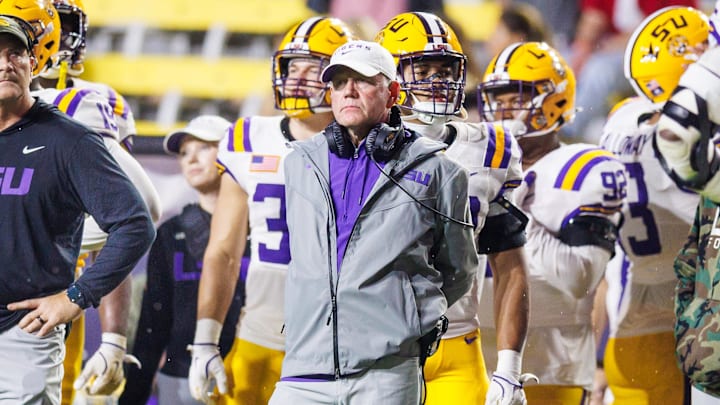With LSU Out of College Football Playoff Consideration, Brian Kelly at a Turning Point

Just shy of three years ago, Brian Kelly arrived in Baton Rouge for the first time as the coach of the LSU Tigers to a cacophony of fanfare. The onetime aspiring politician was treated as if he were a borderline conquering hero coming to the Bayou after a shocking departure from a successful stint with the Notre Dame Fighting Irish.
Up on the dais for the first time in purple-and-gold trimmings, he told his assembled constituency that being part of the SEC was both the opportunity and the challenge of a lifetime.
In the wake of a 42–13 dismantling at the hands of the Alabama Crimson Tide that sent those same fans streaming for the exits of Tiger Stadium with 15 minutes to play on a damp evening, that opportunity seems almost as distant as the challenge seems daunting.
“What we thought would be an exciting evening, turned out to be a disappointing evening,” said an even-keeled Kelly, lacking any sort of the furor he displayed after a loss to the USC Trojans produced a fist-pounding. “We did not make the best of the opportunities we had. Certainly, a lot of the things didn’t go the right way tonight.”
Try nothing. Nothing went the right way for the Tigers. They kicked a pair of first-half field goals and then needed 11 seconds left on the clock to avoid not scoring a touchdown against the Tide for the first time since they were shut out at the same venue in 2018. As far as losses go, it’s hard to find any more lopsided in SEC play than what transpired on Saturday night.
“I felt like that was probably the most complete game we’ve played,” said Alabama coach Kalen DeBoer, not trying to rub it in but underscoring the point the scoreboard made all the same. “Coming into a tough environment, just play after play, just staying the course.”
That they did, and now that ultimate team course, once blown off by a still unfathomable loss to the Vanderbilt Commodores, is back on track toward another College Football Playoff appearance and a customary Alabama shot at a national title.
The one that the Massachusetts sales man trying to make his way in the South is currently trying to steer the Tigers on? Well, that looks aimed more at a New Year’s trip to Florida nobody wants to go on.
Kelly, in near real time this season, is quickly learning the impact the expanded College Football Playoff is going to have on coaches—not just those across the country but very acutely those in the SEC. It is not just assumed that you should make the field with the amount of resources available, from NIL funds to facilities to a nearly unparalleled recruiting base, but you should win something at the same time.
But to miss the field entirely, as it sure looks like will be the case with a third loss on the resume? Well, that might be about as big a faux pas for the 102,283 LSU fans that packed Death Valley as it was for the state’s governor to allow an actual Tiger to trot out Saturday because the real school mascot couldn’t be bothered.
“We had a scheme to stop the quarterback run. We did not get that done. I take responsibility for it and [defensive coordinator] Blake [Baker] is not going to hide from the responsibility. We have to put our players in position to succeed,” Kelly said. “We’re not trading any of them, there’s no waiver wire—we’re not bringing anybody up from the demo squad. We’ve got to come up with the right answers on what works best for the guys that we have and it hasn’t worked very well these last couple of games.”
At this point, the roster is what it is—and entirely of the making of the head coach. Though there are building blocks that can form the nucleus of a contender—freshman Caden Durham averaged 7.9 yards per carry, sophomore Whit Weeks led the team with 15 tackles—it’s not good enough. The talent isn’t there when measured up to the LSU teams of the past and, worse, what quality players are present seemingly have a knack to make a play they shouldn’t in the exact spot they really shouldn’t.
The issues Kelly has failed to address during his time in Baton Rouge were on full display in the fabled “middle eight”—the final four minutes of the first half and the first four of the second—against the Tide. Trailing 14–6, the Tigers seized some momentum by stopping Alabama at midfield on fourth down. Death Valley once again embodied its nickname as the oppressing humidity was equaled by the volume of noise to rain down onto the field in suffocating fashion.
Only instead of choking the Tide, it was LSU that wrapped its hands firmly around its throats.
On the first play after taking over, quarterback Garrett Nussmeier unleashed the lowlight of a subpar, 27-of-42, 239-yard passing, one-touchdown effort with the first of his three turnovers. Linebacker Jihaad Campbell ran nearly untouched on a delayed blitz up the middle, forcing the junior signal-caller to be flushed to his left. There was no escaping, though, as Campbell knocked the ball free onto the wet grass and all but gift wrapped a fumble recovery for an eagerly awaiting Tim Smith.
Tide star quarterback Jalen Milroe needed just three plays to find the end zone after that, weaving through the middle of the LSU defense with ease to underscore its issues containing mobile quarterbacks. He equalled LSU’s team rushing total with 5:30 left in the second quarter and didn’t look back on his way to 185 yards and four scores on the ground to overshadow a crisp 12-of-18 passing night.
Milroe also delivered enough highlights to put him back in the Heisman Trophy hunt, capitalizing on Nussmeier throwing an interception in the end zone by turning it into a 28-yard draw on the other end that found the promised land and all but confirmed the rout was on. Fittingly, given the Tigers’ undisciplined nature this season, a personal foul (that caused fans to start tossing objects onto the field) extended the drive to even allow Milroe the opportunity.
From down one score to 28–6 in the third quarter in what felt like the blink of an eye. A 72-yard touchdown run up the right sideline on the first play of the fourth quarter twisted the knife a final time and sent the remaining fans streaming for the exits.
“I thought our game plan was really good. Obviously, his speed is really good and you can’t really account for that in practice or on film,” said linebacker Greg Penn III, one of seven Tigers to make seven tackles or more in the game. “He’s a great player. I thought our game plan was good—they just went out there and executed.”
“I believe we sent the message to every team that Alabama can run the football,” offensive lineman Tyler Booker said. “This is what we are capable of every week.”
If Alabama is capable of running a team off the field by 29 points in a marquee matchup, why isn’t LSU? The Tigers are not replacing the greatest coach the sport has ever seen nor did they lose a number of key contributors to the transfer portal. That they’ve shown the flashes of being capable, such as in the upset of the Ole Miss Rebels a few weeks ago, only makes matters worse.
Kelly is a good coach. In a college football universe that has just three active head coaches with a national title, he may honestly be a borderline great one. That’s what longevity and a dozen 10-win seasons will get you.
But he, and LSU, have suddenly reached a crossroads they never anticipated reaching, much less just three years into a decade-long contract. The Tigers’ administration won’t become trigger happy and show him the door like the Texas A&M Aggies did to Jimbo Fisher, but those once-creeping doubts that Kelly wasn’t the solution he was made out to be, well, they’re a full-blown crisis of confidence now.
Kelly is just 5–9 against ranked opponents the last four years. That record isn’t awful, and he’s won an SEC West title and produced a Heisman Trophy winner along the way.
Yet, his successor in South Bend, Marcus Freeman, is 10–5 against ranked opponents in the same time frame despite recruiting and landing transfers at a much lower clip than Kelly has been. Across the sideline, DeBoer is 15–3 across his stints at Washington and now Alabama.
Both have shown an Achilles’ heel that Kelly hasn’t in losing to the completely unexpected (DeBoer to the Commodores, Freeman inexplicably to the Northern Illinois Huskies and Marshall Thundering Herd). But both also have their teams pointed firmly at the playoff.
That is the name of the game in 2024 and the standard the 68 power-conference coaches are being held to moving forward.
“We’re dealing with a second loss now in the SEC,” said Kelly a few minutes after he solemnly walked off the field to cries of his ouster from the handful of fans who stuck around solely to let him hear such a message. “We’re on the uphill.”
At the moment, LSU isn’t even on the hill. That’s the problem. Kelly signed up for that kind of pressure. He asked for the challenge. As he now realizes, life comes at you fast when you’re not ready for the occasion.
For a coach who is always striving to be mentioned more with peers like Kirby Smart and Nick Saban than lumped together with the James Franklins of the world, Kelly, it increasingly looks like, was never up to the task with this program that has churned over coaches yet equally produced ones who win national titles.
“You’re living on borrowed time when you keep putting yourself in these tough positions,” Kelly said. “Tonight, the dam broke.”
That doesn’t mean a whole lot for the LSU coach. He’s already underwater and watching the opportunity wash over him.
